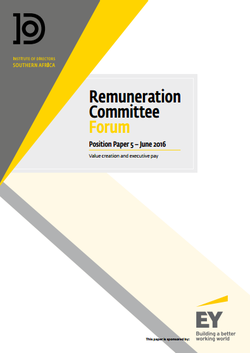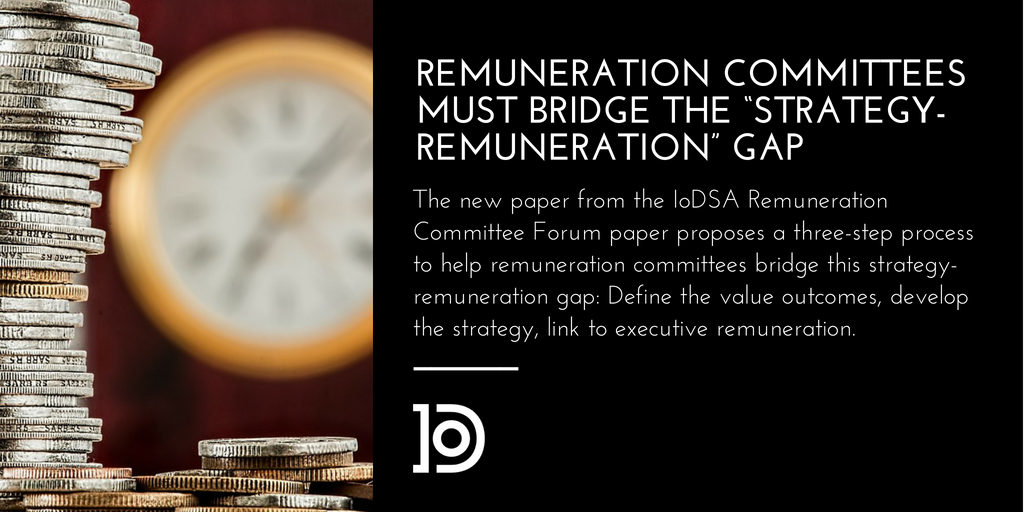|
One of the hardest issues facing remuneration committees is how to structure executive remuneration packages in such a way as to promote value creation, and reward performance that advances the organisation’s business strategy. All too often, the performance measures in the executives’ incentive schemes differ from those in the strategy. As a result, we find organisations asking executives to do one thing yet paying them to do another.
Speaking at the launch of a position paper authored by the Institute of Directors in Southern Africa’s Remuneration Committee Forum on Paying for sustainable performance, its chairman, Ray Harraway introduced the problem. “Over the years, our understanding of performance has deepened and broadened—financial performance alone is no longer considered to be a complete or adequate proxy for sustainable organisational performance. The trouble is that organisations and their shareholders, especially institutional investors, find it hard to agree on what actually constitutes performance and thus what should be measured.” As a result, many remuneration committees adopt remuneration policies and metrics that conform with industry benchmarks rather than the organisation’s unique strategy and the context in which it is operating. In other words, remuneration is often tied to metrics that do not actually create value for the organisation. “This can be called the ‘strategy-remuneration’ gap,” Mr Harraway said. Principle 14 of King IV spells out what remuneration committees have to aim for: The governing body should ensure that the organisation remunerates fairly, responsibly and transparently so as to promote the achievement of strategic objectives and positive outcomes in the short, medium and long term. The IoDSA paper proposes a three-step process to help remuneration committees bridge this strategy-remuneration gap: Define the value outcomes. What these are and how they are measured will differ from organisation to organisation. Remuneration committees should consider measuring not just the outcomes, but the actions taken to achieve them, notes Tim Anderson, an independent governance consultant and one of the paper’s authors. “The reason is that outcomes can be achieved by ‘good’ or ‘bad’ actions and are open to manipulation” he explains. Clearly, remuneration should be linked to the positive actions. Develop the strategy. This step confronts the question of how the organisation will achieve its defined value outcomes. The key step here is to identify the value drivers, the activities that will produce the desired value outcomes. It’s critical that each organisation positively establishes that there is a cause-effect relationship between value drivers and value outcomes. A challenge here is to take into account the fact that long-term projects initiated during an executive’s term of office may only come to fruition long after he or she has moved on. This means that executives would have to be assessed throughout his or her tenure on meeting key milestones rather than on the final result. Link to executive remuneration. The final step is to link the incentive design to the organisation’s strategy. In practice it is usually found to be the weakest of the three steps, and thus where remuneration committees need to do some deep thinking—this weakness is the origin of the strategy-remuneration gap. One key element is to ensure that the link between what is measured in determining remuneration is truly aligned with the business strategy but, counselled Mr Anderson, care must be taken not to include too many metrics. “The skill comes in identifying the metrics that have the most impact on the organisation’s results—too many metrics and you risk confusing the executive and diluting the effectiveness of the remuneration design for creating value,” he said. According to Chad Schaefer, People Advisory Services Africa Leader at EY (the sponsor of the forum), “Getting pay for performance right is hard, but it is the main task facing remuneration committees at the moment, especially given the high profile of executive remuneration. If you can credibly link the salaries and incentives you pay to performance and value creation, you can defend your remuneration policy successfully.” ENDS MEDIA CONTACT: Juanita Vorster, 079 523 8374, [email protected], www.atthatpoint.co.za For more information on the IoDSA please visit: Website: www.iodsa.co.za Twitter: @The_IoDSA LinkedIn: Institute of Directors in Southern Africa Company Page
0 Comments
 The Institute of Directors in Southern Africa’s (IoDSA) Remuneration Committee Forum has released its fifth position paper called “Value creation and executive pay” on the practical measures that boards should take in order to link executive pay with the value they create for the company and all its stakeholders. “Executive pay is one the most visible and criticised aspects of corporate governance,” says Ray Harraway, Director: Remuneration Services at EY and Chair of the Remuneration Committee Forum. “I don’t think anybody really objects to high executive pay so long as it is directly linked to the value that executives create for the company and its stakeholders. However, getting the link between pay and performance right is extremely difficult, and that’s the issue this paper aims to address.” At the heart of this problem is the difficulty in understanding value creation. Before anything sensible can be said about executive remuneration, boards and their remuneration committees have to understand what, for the organisation, constitutes value—and how the company creates value. Once that is understood, the remuneration committee can begin to establish what the desired outcomes are, and what drivers are important in achieving them. A major stumbling block is that, according to 2013 research by McKinsey, only 34 percent of directors surveyed agreed that the boards they served on fully understand their companies’ strategies. Such an understanding is a prerequisite for understanding what value creation looks like and thus, ultimately, how executives should be incentivised. Overemphasis on outcomes at the expense of drivers is one of the common shortfalls of executive incentive schemes, Harraway says. Outcomes may take years to achieve, so they are an inadequate measure of executive performance over the short term, whereas drivers—those actions that lead to the desired outcome—can be better indicators of progress in the short term. To be effective, incentive schemes need to be multifaceted. Both outcomes and drivers should play a role in the design of the schemes, as should a balance of short-term financial performance and long-term sustainability. Thus, for example, while a rise in the annual share price is obviously important, it should not be at the cost of investment in R&D and training, which are vital to the company’s long-term sustainability. And profitability cannot be the sole financial measure used—the return on capital has to form part of the equation when assessing executive performance and how it contributes value creation. Parmi Natesan, Executive Director at the IoDSA and a member of the King IV drafting team, adds that one of the fundamental shifts in King IV is to make the performance/value creation aspect of governance more explicit. “Setting remuneration levels is never going to be an easy exercise, and nor will it ever be a simple matching of actions and results, so the remuneration committee will always need a certain amount of business acumen as well as discretion. Nonetheless, if the value-creation levers are well understood, the committee will be better placed to incentivise the right kind of executive behaviour,’ says Harraway. “For instance, if there is a conflict between actions that might result in lower profits in the short term but are likely to drive long-term value, the incentives should default in favour of the latter.” The paper “Executive pay and value creation pay” can be downloaded by visiting http://bit.ly/29jnAG6 ENDS MEDIA CONTACT: Cathlen Fourie, 082 222 9198, [email protected], www.atthatpoint.co.za For more information on the IoDSA please visit: Website: www.iodsa.co.za Twitter: @The_IoDSA LinkedIn: The Institute of Directors in Southern Africa group |
Archives
July 2024
Categories
All
|


 RSS Feed
RSS Feed